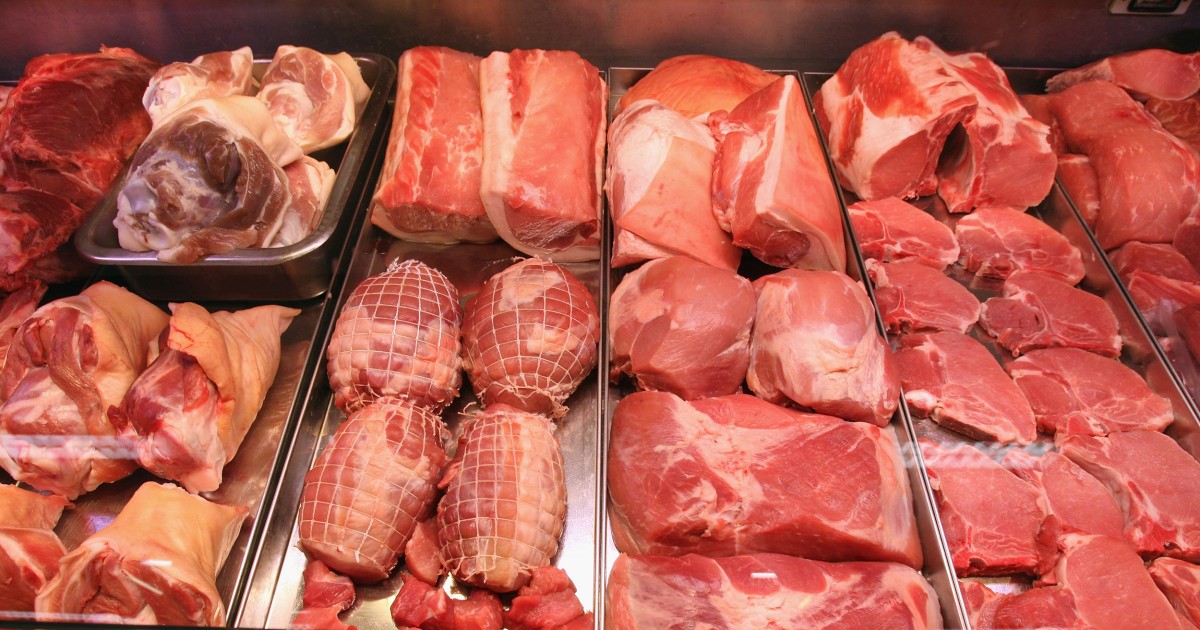Some lean meats are good to eat regularly. Fatty red meats, deli meats and bacon … not so much.
With plant-based eating on the rise—hello, Meatless Mondays—due to health and environmental reasons, you may be wondering whether it’s healthy to eat red meat habitually.
Of course, red meat can be part of a balanced diet when consumed in moderation. Not all meats are created equal, and a particular meat’s nutritional profile (especially fat content and how processed it is) will determine how healthy it is to consume every day. Here, we’re debunking red meat myths and sharing what science says about what consuming meat every day does to your body over time.
You Might Feel More Full

Meat, of course, is a protein source, and lean meats are a high-protein, low-calorie food that keeps you full, according to Jonathan Valdez, RDN, CDCES, CPT, owner of Genki Nutrition and New York City media spokesperson for the New York State Academy of Nutrition and Dietetics. Lean red meat choices include ground beef, top sirloin steak, eye of round roast or steak and tenderloin steak.
You May Build Muscle and Improve Muscle Health

The protein in meat can help with weight loss as well as building and maintaining muscle mass, according to Valdez. One grilled 121-gram tenderloin steak (about 4 ounces), for example, contains 255 calories, 37 grams of protein, 11 grams of fat and 0 grams of carbs, per the USDA. That’s one heck of a protein punch.
Your Metabolism Might Improve

In addition to protein, red meat is a solid source of vitamin B12. “Vitamin B12 is critical for metabolism and is predominantly found in animal-based foods,” says Kris Sollid, RD, a registered dietitian and senior director of nutrition communications at the International Food Information Council. In addition to red meat, you can find vitamin B12 in fish, poultry, eggs and dairy products, per the National Institutes of Health.
You Might Boost Your Heart Health

Vitamin B12 is also essential for heart, nerve and muscle health, according to Sollid. Beef liver and ground beef are among the highest sources of B12, with a serving of either offering 100% or more of your daily value. It’s complicated, though: while their B12 content can help your heart, eating red and processed meats may also be detrimental to your heart health (see below).
Your Metabolism and Energy Levels Might Go Up

Tiredness and lack of energy are common symptoms of anemia, a condition which can develop if you don’t consume enough iron. Lean meat is a great source of iron, and while you can also find iron in plant sources like beans, spinach and peas, our bodies are better at absorbing iron from animal sources, explains Sollid, adding that “iron is key for metabolism and heart health.”
You Might Have an Increased Risk for Cancer

You’ve probably heard that eating more red and processed meat has been linked to colon cancer, and numerous scientific studies support this correlation. That’s bad news for cheeseburger and hot dog lovers. A 2021 study, published in Cancer Discovery, identified a specific pattern of DNA damage in colon tumors for individuals that frequently consumed red and processed meats, which further implicates consuming these foods as a risk factor for developing colon cancer.
You May Increase Your Risk for Heart Disease

As of 2022, heart disease continues to be the leading cause of death in the United States, and a 2021 review of 13 large-scale studies published in Critical Reviews in Food Science and Nutrition by researchers at the University of Oxford found an association between eating more red and processed meats and increased risk of hear disease. The research linked eating an additional 50 grams (1.7 ounces) of processed meat per day with an 18% higher risk, and an additional 50 grams of red meat with a 9% higher risk.
The Bottom Line
Eating meat can be part of a balanced diet. “When lean meats are consumed in a proper balance with fruits, vegetables and whole grains, it can be part of a healthful diet,” Sollid says. However, achieving this balance comes down to how much meat you eat, what kind and how often.
The 2020-2025 Dietary Guidelines for Americans recommends that adults eat about 5 to 7 ounces of protein foods per day, and recommendations vary based on age, sex and level of physical activity. “Within that 5-to-7-ounce recommendation, there is room to diversify your choice of proteins between animal varieties like red meat, poultry, seafood and eggs and plant varieties like soy, nuts, seeds and beans,” Sollid says.
As far as meat options go, consuming leaner, less-processed meats more often than fattier and processed meats (like hot dogs, sausages, bacon and deli meats) is recommended. “Fattier and processed meats typically contain more saturated fat and sodium than leaner cuts of red meat, chicken and turkey,” Sollid says. Valdez added that cured, fatty and processed meats are associated with an increased risk for heart disease, type 2 diabetes and cancer.
Also, if you want to enjoy red meat, official guidelines recommend a “relatively lower consumption” of red and processed meats. While there is no specific number dedicated to red meat, the overall recommendation for animal protein sources (meats, poultry and eggs) for a 2,000-calorie diet is 26 ounces per week. Your health care provider or a registered dietitian can help determine the right amount of red meat for you.
For more inspiration, check out our healthy meat and poultry recipes.
Source: https://www.eatingwell.com








